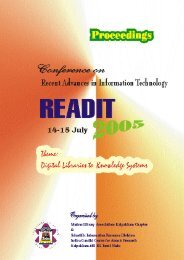READIT-2007 - Indira Gandhi Centre for Atomic Research
READIT-2007 - Indira Gandhi Centre for Atomic Research
READIT-2007 - Indira Gandhi Centre for Atomic Research
Create successful ePaper yourself
Turn your PDF publications into a flip-book with our unique Google optimized e-Paper software.
application of knowledge providing public health benefits; b) knowledge users -the<br />
extent to which evidence based professional practices contribute to the development<br />
of new products and services to improve them; c) Final beneficiaries of knowledge<br />
translation -the extent to which evidence based professional practices are translated<br />
into new improved products and services; d) internal organizational process- public<br />
health organizations must have an account of processes to achieve superior<br />
knowledge sharing, transfer, replication in order to achieve superior outcomes <strong>for</strong> the<br />
public.<br />
CONCLUSION<br />
The gap between what we know and what we practice i.e. know-do gap exist<br />
in public health organizations. Knowledge translation is also on important measure to<br />
bridge the gap between knowledge and action <strong>for</strong> health. It is hoped that public health<br />
organizations in developing countries will try to invest more resources in prompting<br />
measures like- knowledge translation, knowledge management to narrow the gap as<br />
well as develop a culture where decisions taken by policy-makers, health professional<br />
and the public are based on evidence.<br />
REFERENCES<br />
1. Holsapple C W, Joshi KD. Knowledge, manipulation activities: results of a<br />
Delphi study. Introduction and Management 2002; 28: 265-84.<br />
2. Lee C C, Yang J. Knowledge – value chain. Journal of Management<br />
Development. 2000; 19: 783-93.<br />
3. Ipe M. Knowledge sharing is organizations; a conceptual framework. Human<br />
<strong>Research</strong> Development Review. 2003; 2: 227-59.<br />
4. Landry Rejean, Amara Nabil. The knowledge – value chain: a conceptual<br />
framework <strong>for</strong> knowledge translation in India. Bulletin of the World Health<br />
Organization.2006; 84(8): 597-602.<br />
5. Ebener S, Khan A. Knowledge mapping as a technique to support knowledge.<br />
Bulletin of the World Health Organization.2006; 84(8): 636-42.<br />
72

















